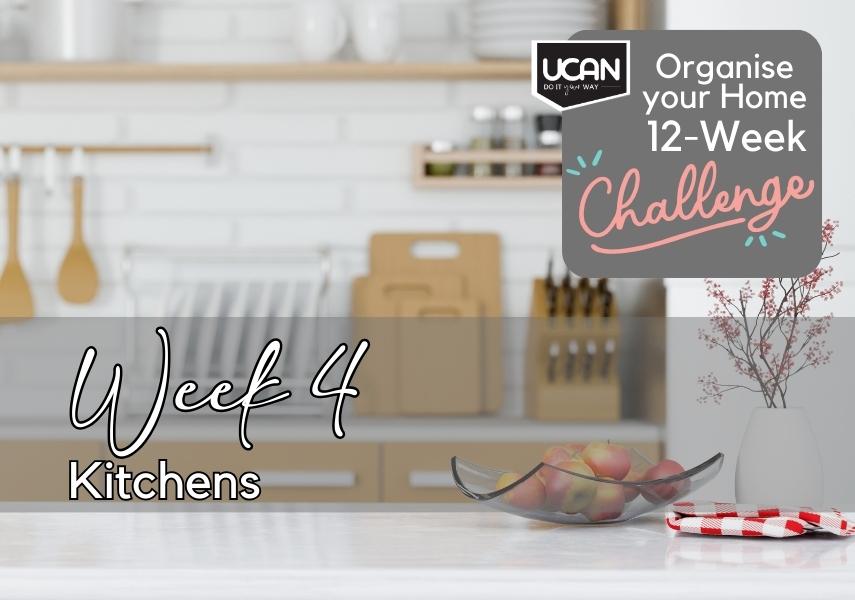Week 4 : Kitchens

The kitchen is where we go to 'nourish' our bodies and families and is often a space that is bulging with things. So many different mugs, and pots, and bowls... we have more dishes, more utensils than we have space for.
Step 1 : Sort & Clean
Do I need it, use it, love it? Remember to ask yourself these questions when sorting through the stuff in the kitchen. Keep what you actually use and give away what you don't to people/charities who can find a use for it. When you think about it, how many vases and salad bowls do you actually need?
Spend some time going through your recipe books and all those recipes you've cut out of magazines over the years. Don't keep rubbish and for those that you are going to keep, start organising them.
Then start sorting through your pantry/groceries, checking the expiration dates on non-perishable and perishable foods and throwing out/donating what isn't good or won't be used. Do the same in the fridge and freezer.
Once you have finished decluttering it is now time to start cleaning appliances, the fridge and freezer, dishwasher and inside the cupboards. Give everything a deep clean and repeat this every 6 months going forward.
Step 2: Zones
Once you have purged, you need to concentrate on the zones in the kitchen. Basically, you need to access what you do in the kitchen over and over, for example, baking. And you know that you do this in the same space with the same utensils. So group these together so that you know exactly where the items you need are and where to put them when you're done. This way you're keeping the guesswork out of nourishing yourself and your loved ones.
The basic 5 zones of the kitchen are:
-
Food Preparation
-
Cooking
-
Clean Up
-
Food Service
-
Food Storage
Step 3 : Make the most of your kitchen space
Gone are the days when we lived in homes with kitchens large enough to cater for a small army. Nowadays it is all about open-plan entertainment areas or cramped modern living. So what do we do if we want to still have a functioning kitchen but don’t have the space to do it? We get creative of course!
- Maximise your wall space by going to the ceiling with shelving. High shelving isn't going to be useful for everyday items or groceries, but it will take care of all the vases, platters and pretty things you seldom use but love.
- There is nothing worse for your creativity that feeling cramped and unable to prep food properly. Reclaim your counter space by using rails with hooks as your utensils can then hang on the wall making them accessible but not 'counter thieves'.
- Make the most of your cupboard space by using the inside of the doors wherever possible. A small rial or a few strategically placed nails an accommodate the pot lids. Spice racks can also be used on cupboard doors to hold soup packets or Ziploc bags.
- In addition, invest in some space-saving gadgets. Racks for wine glasses that hang under the top cupboards, over-door rails to hold your potholders and dishcloths; plate stackers; spice racks to name a few.
- Another cupboard space-saver is to hang pots on a rack above the stove. In years gone by, gorgeous copper pots would hang above the stove. Make it a feature in your kitchen and you'll free up lots of space in your cupboard.
- The use of a moveable butcher block (or island) will give you storage space and additional counter space. If you make or buy one, make sure that it has shelving underneath for prep bowls and appliances.
- Storage for your large platters and items you only take out once a year could be stored in cupboards elsewhere in the home (space permitting). These will still be accessible if you keep them in the dining room sideboards or even the hallway cupboard.
- Tame your 'tupperware' cupboard by limiting the amount you buy and going through your 'stock' every 6 months. Ditch the lids that are cracked and the bottoms that don't have lids. When organising these, stack similar ones together and keep large storage containers separate from smaller ones you use every day. Lids on or off... is up to you. Everyone differs on this point!
- We all need groceries but they do tend to take up lots of space. If your kitchen is cramped, think carefully about how your groceries will be stored as well as what they will be stored in. Get containers (clear is preferable), that will stack well and consider the depth and height of the cupboard in which these will be stored. Then arrange items by group, not by size and remember to keep groceries you use most regularly in the front and at eye-level.
Read our blog, for many more kitchen-related ideas and tips:
https://ucandoit.co.za/blogs/blog/4-ways-to-renovate-your-kitchen
https://ucandoit.co.za/blogs/blog/organise-your-fridge
https://ucandoit.co.za/blogs/blog/organising-your-recipes
